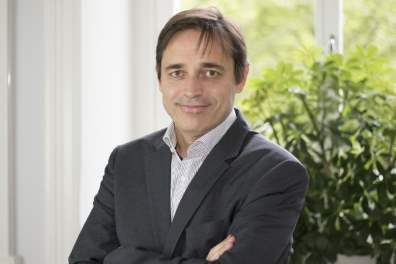Nicolas Delaunay spent a significant part of his career in the private sector, including with CNN International, where he worked for the French-speaking territories: “I was responsible for growing the brand and revenues. But over the years I grew more passionate about sustainable development and environmental issues, and around 8 years ago I got the chance to make the switch; first working on sustainability and climate events – B4E, Business for the Environment Summits – and later for the World Wildlife Fund (WWF), where I was in charge of fundraising and communications for the Gulf chapter, working out of the United Arab Emirates for four years.”
Delaunay says he always knew a bit about the Global Water Partnership, but the biggest trigger for him to want to work in the water sector was living in one of the most arid areas of the world, the Middle East.
“This really sparked my interest further in water resources management issues – the water, energy and food nexus is talked about a lot in this region, given its reliance on food imports, vulnerability to climate change, and given that nearly all its water for domestic use is desalinated, a highly energy intensive process, explains Delaunay.
The Two First Months
Delaunay has spent his first two months doing a lot of background work, listening and learning about what people within the network think – about where GWP is now and what the future might hold. “There is a lot of discussion on where we see ourselves in terms of the 2030 Agenda and the Paris Agreement.”
Delaunay feels that the network has a good foundation to build on.
“I find it particularly exciting and motivating to join GWP when its credibility and achievements have been widely recognized – in terms of spearheading the Integrated Water Resources Management (IWRM) thinking, as well as successfully contributing to getting a dedicated water goal in the Sustainable Development Goals (SDGs),” says Delaunay.
Delaunay says he is also noticing a growing understanding and recognition of water risks from other sectors. “I hear a lot about how the World Economic Forum ranked water as one of the biggest global threats for the coming decade. More and more stakeholders outside the water sector understand the risks we are facing.”
This is a good thing for GWP, he says, because the growing awareness makes it possible for him to reach out to a new category of partners to assess the water security risk together.
Together, collaboration, partnerships – these are reoccurring words that Delaunay uses.
“Partners are the ‘P’ of GWP – they are fundamental,” he says, because water security is something that affects everybody in one way or the other: “It’s not an issue that we can tackle on our own.”
“GWP is ever more acknowledged”
The first big water event that Delaunay participated in, was the recent Stockholm World Water Week. "First I would like to bow my hat to the Stockholm International Water Institute (SIWI) for organising such an inspiring and high quality event", says Delaunay, feeling even more positive with the feedback he received from partners and donors on GWP during the week.
“The relevance of GWP is ever more acknowledged. Its capacity building, integrated and multi-stakeholder approach is a trademark that is recognized by everybody,” says Delaunay, who used the event as an opportunity to get a better feel for what trends are building among various stakeholders.
“One thing I heard loud and clear was the growing role of the private sector and financial sector in contributing to the water sector agenda. Another trending topic was the need to anchor global platforms and agendas in proper country processes. This is an exciting trend for GWP because of our tested experience of convening relevant stakeholders across the spectrum at country level, while at the same time using our knowledge and advocacy capacity at the global level. We can offer a kind of an elevator mechanism between global agendas and platforms and their articulation at country level.”
Partnership Management
In the coming months Delaunay will continue to build his new role in resource mobilisation, but the partnership manager part of his title is equally important:
“Apart from my obvious role in bringing new partners onboard and expanding our work with existing partners, my contribution there can be to catalyze some thinking around what kind of partnerships do we want to promote? Why do we engage in partnerships? What level of communication, transformation and financial commitments do we want to achieve through them? And how do we add value to different kind of partners, platforms and initiatives?”
There are many questions, but Delaunay says GWP’s partners also want answers to these questions. His role is ultimately about supporting the wider GWP network and to facilitate a movement and capacity for the network to be more self-sustained – this includes empowering regions and partners in their own resource mobilisation efforts. Delaunay has already made contact with the GWP regions, and this contact will increase and build over time.
As the interview wraps up, Delaunay has an important message that he wants to convey to GWP’s partners – something he wants them to remember:
“I am a true believer in the power of collaboration to tackle such "larger than life" issues. But something that we must constantly emphasize is the urgency that we are in. We’re talking about a situation that is degrading year after year as far as how climate change is exacerbating water security issues. More than 50% of the world's population will likely live in water stressed regions by 2050. The clock is ticking. We have to partner up, and we have to do it now. My message to our partners is to consider this urgency and act.”

